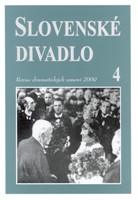Vrbackého preklady na slovenských a juhoslovanských scénach pred rokom 1945
Vrbacký`s Ttranslations on the Slovak and Yugoslavian Stages before 1945
Author(s): Ján JankovičSubject(s): Theatre, Dance, Performing Arts
Published by: Ústav divadelnej a filmovej vedy SAV
Summary/Abstract: Although born in the United States, Andrej Vrbacký(1908-1974) was a Lowland Slovak. His parents returned to Vojvodina shortly after his birth. For the shaping of a journalist and a translator Andrej Vrbacký had utmost importance not only Slovak- Serbian bilingualism, but also the tradition to exercise it – I want to remind that until the half of interwar period most of translations from Serbian and Croatian was done by Lowland Slovaks or Slovaks with permanent residence in the Lowland. From his early years, Vrbacký worked on two-way Yugoslavian-Czechoslovak route in two parallel professions – as a journalist and a translator. He had wide contacts, broad thematic coverage in journalist and translational activities. Vrbacký lived in Yugoslavia, but it did not stand in the way of his cooperation with the Bratislava and Košice theaters. From 1933 to 1945, he was the main supplier of translations to Slovak professional stages – he prepared translations for 13 productions, while only 5 translations of all other authors was staged. Bibliography for the years 1938-1945 contains 54 entries of book translations and professional stage productions, and there are eighteen entries for the name of Andrej Vrbacký, representing 33% of the total production – no other translator was involved in the total production of translations from Croatian and Serbian on such a scale. On the other hand, he translated our Ivan Stodola‘s plays Jožko Púčik and His Career, Tea at Mr. Senator’s, Bankinghouse Kuwich and Comp. into Serbo-Croat and these plays were staged on nearly all the professional stages of then- Yugoslavia. Vrbacký‘s productivity and basic features of his translation program, or rather translation strategy, are evident throughout the all fields of dramatic arts – I do not mean only translation of dramas that came out in the press and staged in amateur theater, but also Vrbacký‘s pioneering collaboration with the Slovak Radio, which he supplied with many translations and his own adaptations of dramas written by South Slavic authors. After the period presented in this essay, Vrbacký still worked as a journalist and a translator and until his late years was a productive and inventive translator. Rich translational and popularizational work of Andrej Vrbacký is an important pillar of Slovak- Yugoslav relations of the 20th century and the extraordinary contribution to Slovak culture and the culture of South Slavic nations.
Journal: Slovenské divadlo
- Issue Year: 57/2009
- Issue No: 04
- Page Range: 270-283
- Page Count: 14
- Language: Slovak

